The 'forgotten city' of the 2007 summer floods
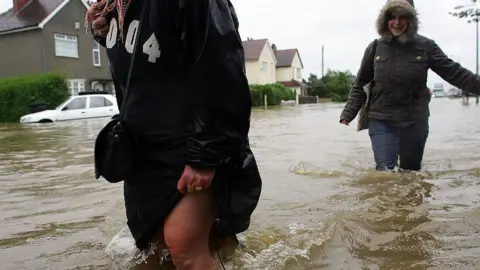 Christopher Furlong/Getty Images
Christopher Furlong/Getty ImagesOn 25 June 2007, Hull was pummelled by rain for hours. Nearly every one of the city's 98 schools was damaged, thousands of people were forced from their wrecked homes, and a young man lost his life in the most horrific circumstances.
But with floods hitting several other parts of the UK in that most unseasonal of summers, the perception soon arose that the people of East Yorkshire were being denied the attention their plight merited and the support they needed.
Coining Hull "the forgotten city", the council's then leader Carl Minns pointed out that "if this was Chelsea or Fulham, this would have been plastered over the front pages for weeks".
Paul Tempest, who would not be able to return to his Cottingham home for a year, recalls there was a stark contrast in the way the floods that affected more affluent parts of Britain were reported.
"When there was flooding down south - we never had that level of news exposure - we saw people on the news in six inches deep of water and it made headlines," he said.
"We thought, 'wait a minute, we've had it to the waist'."
The floods that hit Hull and parts of East Yorkshire were caused by rainwater overwhelming drainage systems, in one instance with fatal consequences.
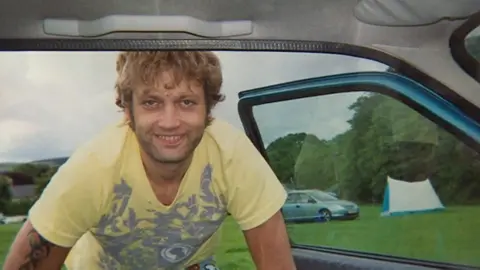 Barnett family
Barnett familyMichael Barnett, 28, became trapped in a storm drain and died from hypothermia during an unsuccessful four-hour operation to free him from neck-high floodwater, which witnesses described as raging "like Niagara Falls".
His father, also called Michael, went to the scene, in Hessle, five miles west of Hull, when he heard his son was in difficulty, but was turned away by the emergency services.
"[My son] said to the firemen, 'are you going to get me out of here?' He then passed out - it was too much for him," Mr Barnett said.
"He had gone under the water and six or seven of the firemen jumped in to try to save him with no thought for themselves - they all could have been sucked to the gate because it was quite fierce.
"He had a good life, he always enjoyed himself, but he has now lost 10 years - would he have married, had children?
"He used to say to me, 'I will look after you in your old age' - I couldn't look after him in his young age."
What happened in June 2007 - the damage caused was put at more than £40m and affected over 10,000 properties - prompted an independent review of the region's flood defences and led to millions being spent on improvements.
However, despite the passing of a decade, some residents and businesses are still dealing with knock-on effects of the deluge.
Former Hedon resident Sally Johnson said: "A friend is still finding problems with her home, she goes out and monitors the rain as she likes to make sure it's not flooding.
"It impacts you for the rest of your life."

Martin Voase, based in the village of Brandesburton, 12 miles north of Hull, said the flood had changed the way he operates his farm.
"Potatoes were one of our main crops. That got completely annihilated and flooded out - we've not grown potatoes since," he said.
"We lost £200,000 of crops that year. We couldn't afford to take the risk of growing potatoes again, that was a big change."
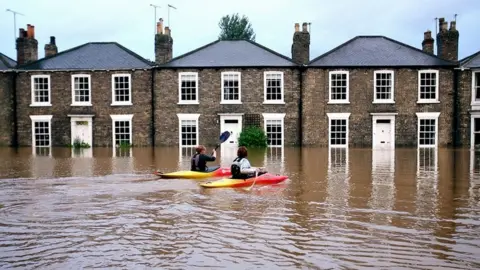 PA
PAMrs Johnson's daughter took to a dinghy to complete her daily paper round as her mother watched children being evacuated from Inmans Primary School opposite their home.
"There were rats on the street afterwards, it was horrible - I felt so sorry for the children," she said.
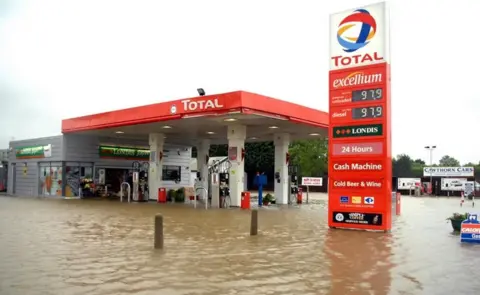 PA
PA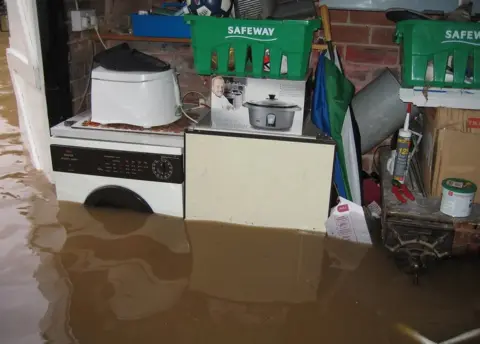 Paul Tempest
Paul TempestEvery classroom of the school ended up underwater - 95 of the 98 schools in Hull suffered flood damage.
Sally Morgan, head teacher of Inmans Primary School, said: "Before the last 20 pupils left, we were gathered in the main hall and water was bubbling up through the floor. The children were standing on chairs.
"A year later we had some heavy rain and one or two of our children got upset and were panicking it was going to happen again; teachers were anxious too.
"We used to take some of the kids with us to check the drains to reassure them."
Clinical psychologists were appointed in the region to help support those children who suffered post-traumatic stress disorder after having to abandon their homes.
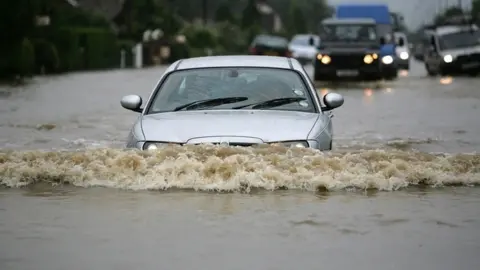 Getty Images
Getty ImagesPaul Tempest recalls there being a "mad rush" for rental housing while repairs were being carried out.
"At the estate agents, they had queues and a sign to a desk saying 'flood victims here'. It was like a warzone and you were almost a second-class citizen," he said.
"Eventually you couldn't get dehumidifiers, you were in a queue for four months just to get one. They became as rare as rocking horse dung."
His memories include carrying an elderly neighbour to safety and seeing piles of ruined furniture and broken TVs appearing on driveways.
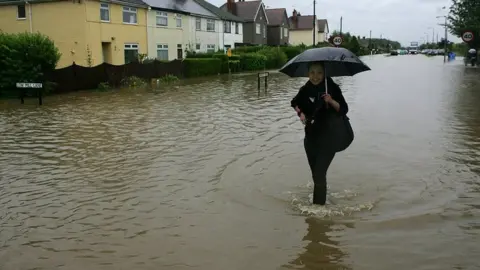 Getty Images
Getty ImagesHis wife Leslie Tempest said: "I know now how people die in cold water; it was bitter, cold. I would not wish it on my worst enemy.
"There was never the recognition that it was a massive disaster, really."
Down the road from their home, seven lagoons capable of holding four million gallons of water were later created to store run-off from the Raywell Valley during storms.
Following the Pitt Review, which looked into the overall impact of the June and July floods that killed 13 people nationwide, increased funding was provided to help deal with surface water flooding.
More than £50m has been spent on defences in Hull and East Yorkshire since 2007, with a further £120m to be spent in the next four years, the Environment Agency said.
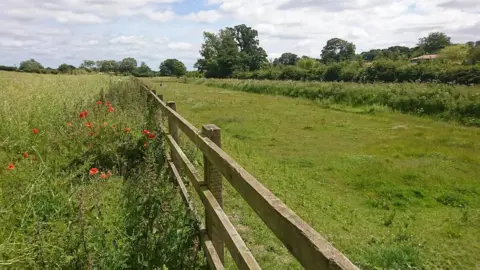
But shoring up defences and renovating homes is only part of the process of moving on, points out Prof Maggie Mort, a Lancaster University academic who researched Hull's recovery from the floods.
She said the mental struggle of having to rebound from such an occurrence "affects people very deeply".
"It's not the flood itself that causes the trauma, it's how you are treated afterwards and how your community, your family and agencies around you help you rebuild the social and personal fabric of your lives.
"The emergency phase of a flood gets the most attention [in the media], but the long slog of recovery is overlooked."
This effort to rebound from the despair caused by flooding is something that resonates with Jennifer and Michael Fox, whose home on Corona Drive near the city centre was in one of the areas worst hit by the deluge.
The couple said what happened made them reassess what was important in their lives and caused them to try to keep a positive attitude, despite their plight.
Mrs Fox said: "Your doors, your walls, your sandbags: nothing can stop the water, nothing at all. By the next morning all of the water had gone, but everything was just absolutely ruined."
They cooked upstairs on a camping stove and washed their clothes in the bathroom while repairs were carried out.
"The men [working on] the house accidentally cut through the water pipe and flooded it again," Mr Fox said.
"We just fell about laughing, because it couldn't have got any wetter than it already was."
